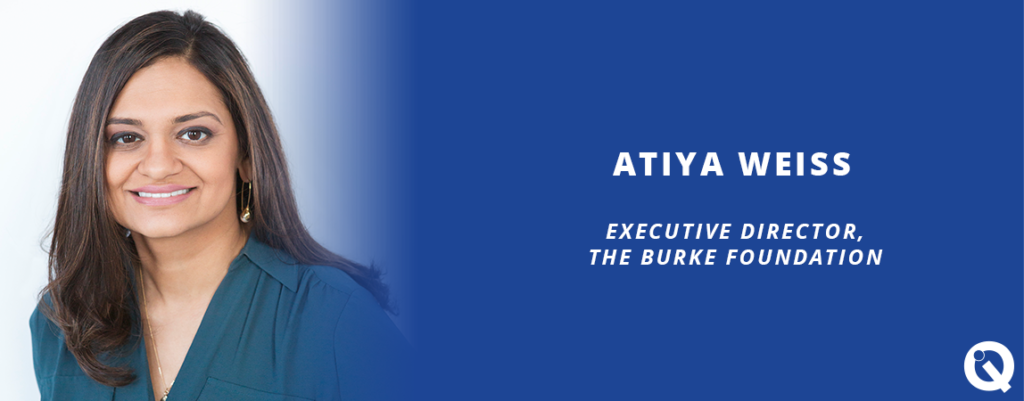Atiya Weiss, Executive Director of The Burke Foundation, is integral to shaping the foundation’s focus on maternal and child health. The Foundation recently released its new strategy, “Building Strong Partnerships for Community and Care in the First 1,000 Days.”
Can you tell us about your strategy to improve child health in New Jersey?
The new strategy reflects our commitment to helping transform the health care system to deliver better prevention and community connections for babies, mothers, fathers, and families. We focus on those first 1,000 days of life because they are critical for child development and can affect lifelong health and wellbeing. Where we live, what we eat, the stressors we experience — they account for 80 percent of health outcomes. During the first 1,000 days, it’s vital to consider these and other factors influencing health — and then to connect families to much-needed clinical care and other community-based services.
This work involves four key initiatives: growing and diversifying the community doula workforce; expanding the CenteringPregnancy and CenteringParenting group healthcare model to 50 sites across New Jersey; supporting statewide implementation of universal newborn home visiting; and piloting the HealthySteps pediatric team model. Our strategic vision also focuses on the two-generation impact of creating a strong perinatal workforce and promoting economic stability for birth workers and their families.
The big news is the Burke Foundation’s $20 million commitment, over five years, to strengthen evidence-based initiatives that target those first 1,000 days to help New Jersey families thrive. The Quality Institute is a great partner, with a policy agenda that matches our emphasis on the earliest possible involvement with child health and development.
How has the work of the Burke Foundation in the last few years informed your new strategy?
What we learn plays a huge role in where we go next. We’ve been part of the groundbreaking New Jersey ACEs Collaborative to prevent and protect against the impact of adverse childhood experiences and improve health and wellbeing. We worked on ACEs as partners with the New Jersey Department of Children and Families, The Nicholson Foundation, and the Turrell Fund. As part of this effort, we supported the New Jersey Office of Resilience, the first of its kind in the nation, helping to make New Jersey a more resilient state. The extent to which young children face trauma was eye-opening and reinforced our sense of urgency.
The word “resilience” refers to adapting and overcoming in the face of adversity, trauma, tragedy, threats, and other significant sources of stress. Learning about the long-term impact of adverse childhood experiences led us to seek best antidotes to ACEs: safe, nurturing, and stable relationships. Building on our learnings, and the attention New Jersey First Lady Tammy Murphy put on unacceptable Black maternal mortality rates in our state, our new strategy emphasizes promoting nurturing relationships between babies and caregivers during the first 1,000 days of life to help prevent or mitigate the impact of ACEs later in life.
Can you share with us your passion as an individual for the work you are doing?
As a child growing up in Mystic, Connecticut, I was diagnosed with a rare blood disorder that didn’t allow my body to produce enough platelets. I couldn’t play on the swings or play dodgeball at recess because my body bruised easily, and I spent a lot time interacting with the medical system. While my childhood was at times challenging and lonely, I was fortunate to have love and support from my family, extra help from my teachers, a caring medical team at Yale New Haven Children’s Hospital, and a supportive community in my parents’ adopted country. The work Burke does to strengthen the ripples of support around families is very personal and rewarding to me.
I’m also honored to be an Aspen Institute Ascend Fellow working on advancing two-generation solutions with amazing leaders from across the country. As part of my fellowship, I’m involved in growing the community doula workforce in New Jersey.
Community doulas compliment clinical care by providing tailored, emotional, physical, and social support — as well as guidance during pregnancy, childbirth, and the postpartum period. More than that, though, they are trusted community members who can navigate language and cultural barriers and serve as liaisons between their clients and health care providers, while providing connections to local resources, such as food assistance and housing. We support the AMAR Community Doulas, a program with The Children’s Home Society of New Jersey and one of the first doula pilots in the state to focus on Spanish-speaking clients. They’ve served more than 100 families and trained 23 new doulas, with highly promising results: 71 percent fewer preterm births and 63 percent fewer low-risk C-sections. Based on that success, we’re partnering with the Partnership for Maternal and Child Health of Northern New Jersey to implement their new community doula program in Paterson, called Community of Caring: The Paterson Doula Cooperative.
By listening, engaging, and working with women of color and community leaders to better understand the challenges and barriers they face during pregnancy and post-partum and, importantly, focusing on the solutions they want to see, we’ll have better healthcare. I’m grateful to see the philanthropic sector seize this moment for change.
Finally, we like to ask a question about people’s lives outside of work. So where would we find you on a day away from work?
My husband, Joe, and I have two boys, ages six and eight. They keep us very, very busy. And we try to get outside as much as possible. We love hiking together, and recently went boulder scrambling in the Sourland Mountains. You use your hands and legs to climb boulders and rocks — so a little stressful to watch as a mom. We also love to spend time cheering our boys’ soccer teams and reading together as a family.

